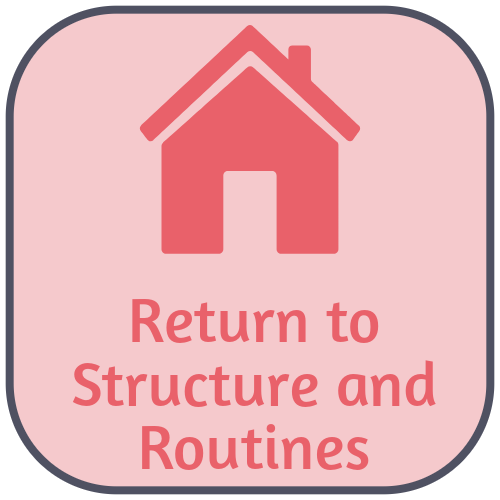Routines
Reflective Questions
How do you help learners with their daily and weekly routine?
Is structure and routine used throughout the day/week e.g. set format to the day, set times for PE or music?
How do you support learners to understand routines and to understand changes to routines?
How do you prepare learners before each change?
How do you support learners to practice and prepare for new experiences?
Are lessons planned to follow a consistent format?
Are the learning intentions made clear at the start?
Are learning outcomes reviewed and summarised?
Are there routine opportunities for active learning and multisensory learning?
Are there opportunities for practice and repetition?
Are there routine opportunities for movement breaks?
Are consistent /predictable seating plans in place?
Actions/Strategies
Carry out – Learner discussion template – Structures.pdf – Google Drive
Things to consider –
When are learners most focused during the day? Design your day around this knowledge. Highlight times for breaks / movement.
Link activity to expectations e.g., noise level, movement around class etc ensuring learners are central to this discussion.
Consider simple, re-usable individual timetables for learners who may require this to keep focused.
A simple, self-checking visual schedule can help some learners to remain focused. Moving over the task to “done” once completed can be motivating for learners. The text, images and number of tasks can be altered to suit the learner’s needs.
Self-reflect – Do your learners know the schedule of the day? Do you prepare for transitions? Would any learners benefit from individual schedules?
Self-reflect –How often do you discuss with learners how the learning can help them in everyday life and in the future?
Watch – John Hattie Learning Intentions and Success Criteria (youtube.com)
Self-reflect – How often do you share the learning intention and success criteria around key learning themes? Do your learners have opportunities to co-construct these with you? How?
Use visual timetable to support understanding of predictable routines and reduce anxiety.
Use visual cues to support understanding of changes to routines to reduce anxiety
Repeat instructions i.e. exact or modified
Regularly check the learner’s understanding
Provide talking and listening opportunities
Use turn taking games ◊ Use supports for turn taking
Provide opportunities for show and tell
Regularly engage in listening, talking and turn-taking
Use visualisation and verbalisation
Regular specialist groups to develop communication
Regular planned breaks throughout the day when required
Agree a strategy for the learner to indicate when they require support
Use a home-school diary
Organise a peer befriender for the playground
Consider: The use of plenaries are another routine activity to have in your teaching toolkit to help provide structure to a learning experience. It also links well with research around differentiation that continuous assessment is key. Plenaries are an excellent tool to assess learner’s understanding in real time and support you to adapt your planning based on this assessment
Features of a plenary:
refers to and consolidates the most important learning points of the lesson or the learning intentions stated at the beginning of the lesson
puts the learning in context, by linking it both to prior learning and to the coming stages, and allows students to reflect on their learning
gives opportunities for informal assessment – your quick check that learning has taken place for the whole class
helps you judge the next steps – important in enabling you to plan the next lesson
should be differentiated to the needs of your students
Further Reading/Watching
Building Strong Foundations With Classroom Routines (youtube.com)
Zones of Regulation Activities – The OT Toolbox
Self-regulation strategies | EEF (educationendowmentfoundation.org.uk)
| STEM
LI & SC (glowscotland.org.uk)
4bloomsplenaryquestionsfan.doc (live.com)
A teachers guide to Lesson Plenaries (structural-learning.com)
Visual supports – Speech and Language UK


